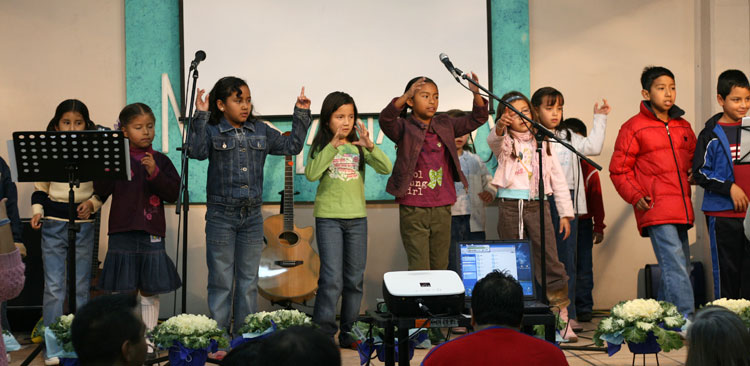Stephen Kriss, Director of Communication and Leadership Cultivation
This is the last issue of Franconia Conference’s Growing Leaders. It’s a tough time for print publications, from the weeklies in my neighborhood of Northwest Philadelphia to the national papers like the Los Angeles Times. Today’s economic turbulence is accelerating the move from paper to web-based communication. With changes in our cooperative arrangement with Virginia and Lancaster conferences, we’ve decided to accelerate our changes as well.
Growing Leaders grew out of a desire for increased collaboration among the conferences of the Northeast corridor of Mennonite Church USA. After nearly a decade of publication, those relationships have changed and grown. We began by working together around expectations for credentialing and leadership development, now we’re moving toward more coordination of efforts around church-planting and mission. With this move, along with financial belt-tightening across MC USA, it’s time to change our approach toward how we equip and share ideas.
This change comes at the same time as the implementation of the LEAD (Leading, Equipping and Discipling) model of conference ministry being introduced into Franconia Conference congregations. Growing Leaders provided a meaningful communication and formational venue for leaders. It’s a venue we’ll miss, but will seek to supplement in new ways as the LEAD model for ministry emerges.
We’ll continue to move toward clear and more consistent communication efforts by increasing web-based supplements of blogs and information—nearly all conference communication will move into a virtual sphere, except for Intersections, which is becoming our bimonthly conference flagship publication. Conference staff may well be tapping more of you to help write and contribute as our conversation moves into more responsive and fluid virtual space. While the signs of the journey suggest that we’re picking up speed in a more interconnected world, we’re looking for ways to provide more timely and contextual resources.
Though it’s hard for me to imagine (or desire, really) a world without paper-based publications, we’ll likely need to continue to find new ways to share information and offer formation resources that extend our shared goals of healthy and growing leaders, disciples, congregations and connections that are both near and far. This could mean increased use of technology, but will likely need to be balanced with intentional relationship-building and sharing in face-to-face settings as well. Both the virtual and “real” will be increasingly important in this age to come.
May God who can move us into the future—with more creativity and imagination than we can muster—be illuminated in our work and our connections, now and forevermore.

 I traveled to Indonesia before Christmas to attend a Conference on the Peace Church in the Asian Context and to connect with partner congregations in Indonesia. I visited with Troy Landis from
I traveled to Indonesia before Christmas to attend a Conference on the Peace Church in the Asian Context and to connect with partner congregations in Indonesia. I visited with Troy Landis from 
 There is a deep resonance with our history and a deep hope for our future as we work together. Though the situations are not the same, the contemporary situation for Indonesians in the United States echoes Mennonite history. When I told the story of Indonesian Christians to the sons and daughters of Russian Mennonite émigrés in Canada, they immediately asked how it would be possible to help, insisting that its our responsibility to help persons facing persecution or the possibility of persecution to escape before it’s too late.
There is a deep resonance with our history and a deep hope for our future as we work together. Though the situations are not the same, the contemporary situation for Indonesians in the United States echoes Mennonite history. When I told the story of Indonesian Christians to the sons and daughters of Russian Mennonite émigrés in Canada, they immediately asked how it would be possible to help, insisting that its our responsibility to help persons facing persecution or the possibility of persecution to escape before it’s too late.
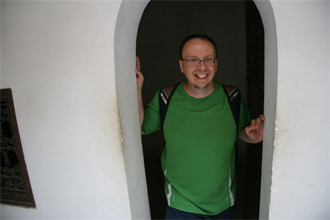 We were sitting in a train, knee to knee with two college students from North Jersey who had taken the summer to trek through Europe, side by side with two Moroccan women in traditional garb who were traveling with a teenage boy with bright and eager eyes. We conversed back and forth with the Jersey students who were finishing their trip across Europe with a quick jaunt into Morocco.
We were sitting in a train, knee to knee with two college students from North Jersey who had taken the summer to trek through Europe, side by side with two Moroccan women in traditional garb who were traveling with a teenage boy with bright and eager eyes. We conversed back and forth with the Jersey students who were finishing their trip across Europe with a quick jaunt into Morocco.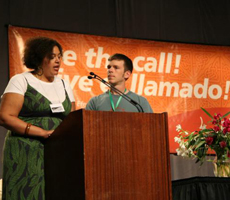 We had a good time together in California, the 6,000 or so Mennonites who gathered at San Jose 2007. Youth sang hymns late into the night on the city’s efficient light rail. We heard new Mennonites like Phoenix pastor Shane Hipps tell his story of becoming Anabaptist first in the head, then in the heart. Brother George Makinto from Los Angeles lead the adults with grace and ease in multilingual worship. A team from Eastern Mennonite University produced creative and high quality video for youth and adults all week. It was a time of hopeful interaction.
We had a good time together in California, the 6,000 or so Mennonites who gathered at San Jose 2007. Youth sang hymns late into the night on the city’s efficient light rail. We heard new Mennonites like Phoenix pastor Shane Hipps tell his story of becoming Anabaptist first in the head, then in the heart. Brother George Makinto from Los Angeles lead the adults with grace and ease in multilingual worship. A team from Eastern Mennonite University produced creative and high quality video for youth and adults all week. It was a time of hopeful interaction.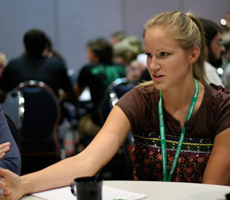 The anti-racism reports from denominational agencies thinly mask the embarrassing realities of racial/ethnic tokenism within most of our institutions. Young leaders frequently find themselves on the margins of engagement and decision-making even when present at the table. I am convinced that by opening the church and its institutions beyond token additive presence to persons under 30 and racial/ethnic leaders, we’d find surprising new structures that lean toward relevance, sustainability, and flourishing. We need the creative audacity of those leaders to transform our ways of doing and being into a real future. We need those transformative insights now, not in a decade after the average Mennonite Church USA member is over 65.
The anti-racism reports from denominational agencies thinly mask the embarrassing realities of racial/ethnic tokenism within most of our institutions. Young leaders frequently find themselves on the margins of engagement and decision-making even when present at the table. I am convinced that by opening the church and its institutions beyond token additive presence to persons under 30 and racial/ethnic leaders, we’d find surprising new structures that lean toward relevance, sustainability, and flourishing. We need the creative audacity of those leaders to transform our ways of doing and being into a real future. We need those transformative insights now, not in a decade after the average Mennonite Church USA member is over 65.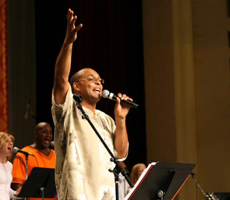 Audacity within our denominational structures involves the risk of confronting the limitations of continuing administrative activity from Elkhart and Newton. I cringe at the realization that it seems we’ve already embraced a future for our denomination in which we’re working mostly from small cities in the Midwest, ignoring early MC USA transformation commitments to bi-coastal presences. Have we deemed coastal locations too expensive without counting the costs of a future that ignores urban, multi-ethnic, bi-coastal realities?
Audacity within our denominational structures involves the risk of confronting the limitations of continuing administrative activity from Elkhart and Newton. I cringe at the realization that it seems we’ve already embraced a future for our denomination in which we’re working mostly from small cities in the Midwest, ignoring early MC USA transformation commitments to bi-coastal presences. Have we deemed coastal locations too expensive without counting the costs of a future that ignores urban, multi-ethnic, bi-coastal realities? These snapshots have literally kept me awake at night for the last weeks, wondering and imagining how we might get there and yet knowing that we’re already on the road whether we admit it or not. It’s a future that excites me and forces me to think and rethink, to struggle and embrace the moments of hope that manifest along the way. It’s a future that in many ways is already here.
These snapshots have literally kept me awake at night for the last weeks, wondering and imagining how we might get there and yet knowing that we’re already on the road whether we admit it or not. It’s a future that excites me and forces me to think and rethink, to struggle and embrace the moments of hope that manifest along the way. It’s a future that in many ways is already here. The future will include a struggle for traditional EuroAmerican Mennonites to embrace possibilities, responsibilities and roles. It’s an ongoing struggle for me and for many young EuroAmerican leaders to understand what to do with power and privilege and how to consider empowerment and solidarity. Who are we in this global age if we are anything more than an ethnicity? What does it mean to live Anabaptist Mennonite values in urban contexts with extreme disparities? Why is it that our orientation toward justice and peacemaking is pacified by suburban lifestyles and wealth? What does it mean to have the ability to speak to the powers and to shape decisions that affect not only those in our own country but the globe? What happens when the majority of Mennonites no longer represent my own cultural preferences or biases? These were the kind of questions that are emerging for young adults who are serving with Mennonite Voluntary Service in Washington and studying and seeking at EMU. What does it mean to be a daughter or son of privilege? The future will require EuroAmericans to navigate a new way that blends what we know of the past into current and yet unfolding realities. The future will likely require EuroAmericans to ask more questions and to offer fewer quick answers or solutions.
The future will include a struggle for traditional EuroAmerican Mennonites to embrace possibilities, responsibilities and roles. It’s an ongoing struggle for me and for many young EuroAmerican leaders to understand what to do with power and privilege and how to consider empowerment and solidarity. Who are we in this global age if we are anything more than an ethnicity? What does it mean to live Anabaptist Mennonite values in urban contexts with extreme disparities? Why is it that our orientation toward justice and peacemaking is pacified by suburban lifestyles and wealth? What does it mean to have the ability to speak to the powers and to shape decisions that affect not only those in our own country but the globe? What happens when the majority of Mennonites no longer represent my own cultural preferences or biases? These were the kind of questions that are emerging for young adults who are serving with Mennonite Voluntary Service in Washington and studying and seeking at EMU. What does it mean to be a daughter or son of privilege? The future will require EuroAmericans to navigate a new way that blends what we know of the past into current and yet unfolding realities. The future will likely require EuroAmericans to ask more questions and to offer fewer quick answers or solutions.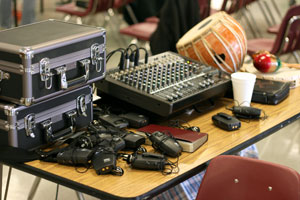 The music at New Hope was sung in English and Spanish that was led by a multiethnic team that included a French speaking African. There was translation. There was back and forth discussion between the congregation and Pastor Kirk Hanger, sometimes in English, sometimes in Spanish. The sermon featured interpretation of the Good News and the difference between good history and good news is its relevancy for the day. Pastor Kirk serves essentially to translate in many ways between the cultures and between the text and the time. The future will include translation sometimes by headset, sometime by incarnation, sometimes by words. We’ll learn to speak in ways that bridge cultures and work past presumptions.
The music at New Hope was sung in English and Spanish that was led by a multiethnic team that included a French speaking African. There was translation. There was back and forth discussion between the congregation and Pastor Kirk Hanger, sometimes in English, sometimes in Spanish. The sermon featured interpretation of the Good News and the difference between good history and good news is its relevancy for the day. Pastor Kirk serves essentially to translate in many ways between the cultures and between the text and the time. The future will include translation sometimes by headset, sometime by incarnation, sometimes by words. We’ll learn to speak in ways that bridge cultures and work past presumptions.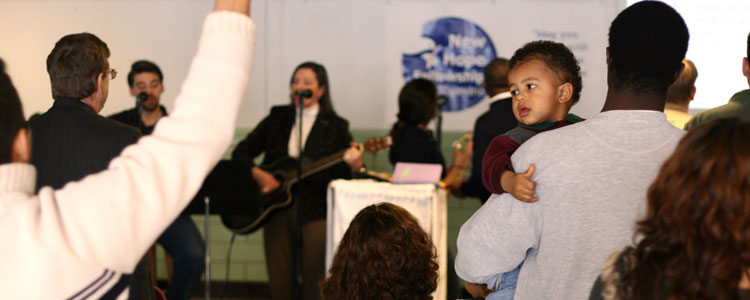
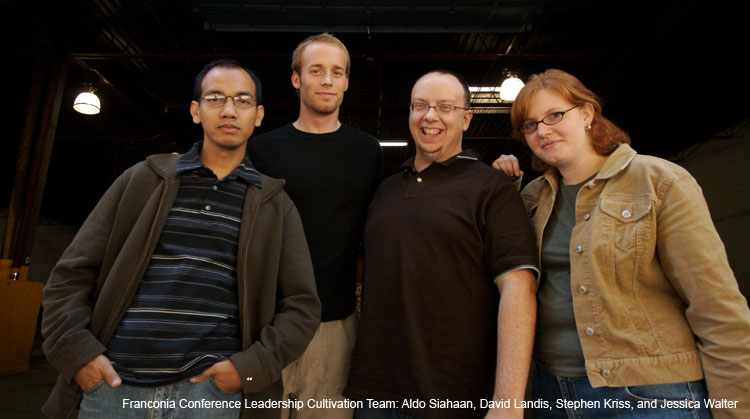
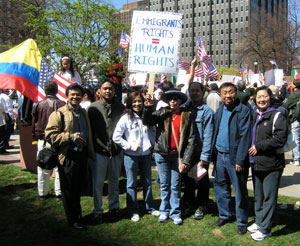 I’m working with the fourth immigration case that has taken me to an office in a building overlooking the mall between the National Constitution Museum and Independence Hall. On my last visit, the receptionist remembered that I had been in the office on my birthday. We went back to the counsel office and I listened as another immigrant who is part of a Franconia Conference congregation tell her story. I promised the lawyer that I accompany only complicated cases. He agreed.
I’m working with the fourth immigration case that has taken me to an office in a building overlooking the mall between the National Constitution Museum and Independence Hall. On my last visit, the receptionist remembered that I had been in the office on my birthday. We went back to the counsel office and I listened as another immigrant who is part of a Franconia Conference congregation tell her story. I promised the lawyer that I accompany only complicated cases. He agreed.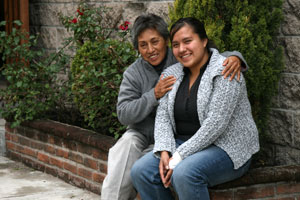 A Mennonite Central Committee worker recently suggested that Mennonites are good at cleaning up after messes, but less willing to figure out why we keep getting into them. Now into my fourth accompaniment situation for immigrants who are part of our congregations, I am compelled to respond differently to this situation. Sure, I can keep sitting in on these interviews and spend all of the birthdays of the rest of my life listening to the awkward situations and quagmires of process that are immigration realities. However, I am not content to continue accompanying our sisters and brothers to Center City law offices or to suggest that the situation is so complex that we can’t begin to address it in real ways either.
A Mennonite Central Committee worker recently suggested that Mennonites are good at cleaning up after messes, but less willing to figure out why we keep getting into them. Now into my fourth accompaniment situation for immigrants who are part of our congregations, I am compelled to respond differently to this situation. Sure, I can keep sitting in on these interviews and spend all of the birthdays of the rest of my life listening to the awkward situations and quagmires of process that are immigration realities. However, I am not content to continue accompanying our sisters and brothers to Center City law offices or to suggest that the situation is so complex that we can’t begin to address it in real ways either.